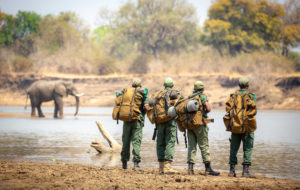
Wildlife rangers across Africa safeguard biodiversity for all of us – from the air we breathe, to the water we drink. Rangers are ecosystem guardians on behalf of the global community. But these men and women are so often unrecognised for their enormous impact. It’s time to take action.
Africa is home to almost 30% of the world’s biodiversity and a third of the planet’s fresh water. Wildlife rangers working in protected areas manage large tracts of these natural resources.
Yet the continent is disproportionately impacted by globally-induced climate change. Regions like Africa are much more vulnerable to the effects of the climate crisis than the global north. The African continent has also contributed the least to the problem, accounting for just 4% of global carbon emissions.
The forests of the Congo River Basin alone absorb 3% of global carbon emissions every year. And the protected African grasslands, shrublands and savannas where many rangers work store more additional carbon than ecologically similar non-protected landscapes – demonstrating the climatic benefits of the ranger role and the landscapes they work in.
Unless the role of African rangers is valued as a profession and recognised by the international community, ambitious global conservation targets (such as the 30×30 commitment) and governance and equity goals will fail.
We currently only have 286k of the 1.5m rangers needed to protect 30% of the planet by 2030. An increase in the ranger force to the size needed is impractical, costly and unachievable.
A more strategic solution is to increase the efficiency of managing protected and conserved areas by boosting the support provided to ranger teams by the international community and to catalyse the development of the ranger profession as a whole. This can only happen with increased recognition of the fundamental contribution rangers make to conservation.
In collaboration with partners including the Game Rangers Association of Africa, and with the support from founding donor the Scheinberg Relief Fund, the Wildlife Ranger Challenge is driving a global movement #ForWildlifeRangers, channeling funding, expertise and awareness for those that hold the knowledge, skills and passion to meet global demands and targets.

Wildlife rangers are also fundamental to Africa’s anti-poaching efforts. The continent’s illegal wildlife activity is, in part, driven by markets in the global north including the UK and the USA.
The UK’s 2020 national risk assessment (NRA) of money laundering and terrorist financing suggests that the country is a source, transit and destination country for illegal traded wildlife, with illegally traded elephant ivory, rhino horn and hippo ivory contributing to the demand for the poaching market within Africa.
And The National Crime Agency’s 2020 National Strategic Assessment of Serious and Organised Crime specifically recognises the risk of bribery and corruption associated with politically exposed persons (PEPs) involved in the illegal wildlife trade abroad to be an ‘emergent threat’ to the UK. Furthermore, organised crime is known to be linked to rhino horn thefts and trade within the UK.
As the global north is responsible for contributing in part to illicit poaching across Africa, we must do all we can to support and resource those that are risking their lives to combat it. Initiatives like the Wildlife Ranger Challenge can channel these resources and funds. As well as raising over $16 million so far, the Wildlife Ranger Challenge campaign has also connected thousands of rangers from 24 African countries with many thousands of supporters from more than 90 countries around the world – uniting the global north and the global south in a common goal. You can play a part in supporting wildlife rangers by donating to the campaign, or by registering to take on the challenge yourself.
Source RUSI Whitehall Report, January 2022, Illegal Wildlife Trade and Illicit Finance in the UK.



